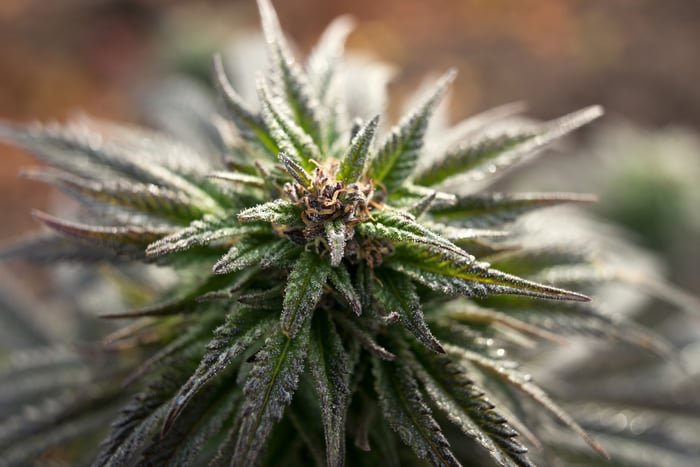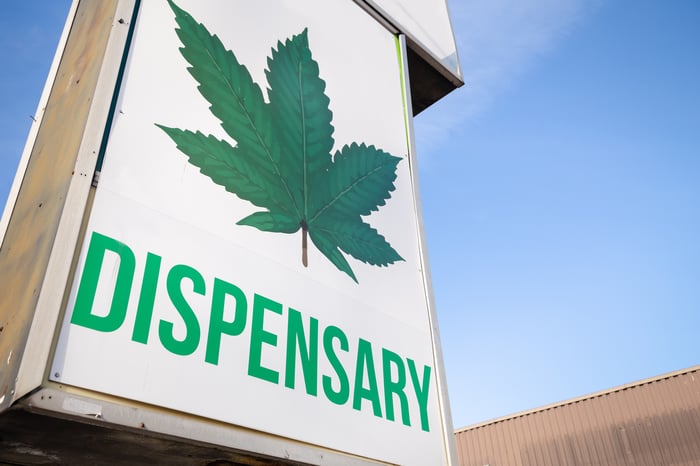In just 22 days, Americans across the country will head to their local voting booths or mail in their ballots to determine the course the U.S. will take over the coming four years. Numerous issues will be deciding factors on Election Day, including the candidates' proposed coronavirus response and economic growth plans.
But as we inch closer to the election, don't forget about marijuana.

Image source: Getty Images.
Favorability toward cannabis is budding nationwide
As recently as 15 years ago, speaking about cannabis in the political sense was considered taboo, and only a third of the country favored legalization. Yet as of Gallup's October 2019 poll, two-thirds of all survey-takers supported the idea of a nationwide legalization.
Furthermore, previous polls from the independent Quinnipiac University have placed support for medical marijuana even higher, with better than 9 in 10 polled in favor of physicians being able to prescribe medical pot to patients.
As we head into Election Day, 34 U.S. states have waved the green flag on medical marijuana, with 11 of these states also allowing for adult-use consumption and/or retail sale. California, one of the 11 states to have legalized recreational pot, is currently the U.S. and global leader in annual cannabis sales.
And yet marijuana firmly remains a Schedule I controlled substance (i.e., entirely illicit) at the federal level.
The question voters are left to ask is, "Will this change anytime soon?"

Sen. Kamala Harris at a healthcare rally. Image source: Kamala Harris' Senate Web page.
Joe Biden and Kamala Harris want to decriminalize weed at the federal level
Among the numerous talking points covered by the vice presidential candidates in last week's debate, Democratic Party nominee Kamala Harris (Calif.) echoed a position put forth by Presidential nominee Joe Biden that, if elected, marijuana would be decriminalized at the federal level.
This is a position that the Biden campaign has held for more than a year. In fact, Andrew Bates, a spokesperson for the Biden campaign, had this to say in an interview with CNN back in May 2019:
Vice President Biden does not believe anyone should be in jail simply for smoking or possessing marijuana. He supports decriminalizing marijuana and automatically expunging prior criminal records for marijuana possession, so those affected don't have to figure out how to petition for it or pay for a lawyer.
If Joe Biden and Kamala Harris were to win in three weeks, we'd see cannabis use and possession (within set guidelines) removed as a criminal offense at the federal level. Marijuana would also be moved from its current Schedule I classification, which places it alongside LSD and heroin, to Schedule II. For context, a Schedule I controlled substance has no recognized medical benefits, whereas a Schedule II substance does have accepted medical uses, albeit a high probability of abuse, too.
What would decriminalization mean? Without the fear of federal prosecution, we could see banks and credit unions finally opening their doors en masse to the U.S. marijuana industry. Although some financial institutions have been willing to offer basic banking services in legalized states, many still fear the potential for criminal and/or financial penalties.
We might also see an uptick in recreational cannabis use in the United States. Without the fear of criminal punishment, short of being caught with more than a predetermined amount of marijuana, consumers might be more willing to try cannabis products.

Joe Biden listening to former President Barack Obama. Image source: Official White House Photo by Pete Souza.
News flash: Decriminalizing marijuana could make things worse
However, I have some bad news for the crowd who believes that decriminalization is going to resolve the industry's shortcomings: It's not.
Although access to capital could become easier, decriminalization fails to resolve a number of key issues plaguing the U.S. pot industry.
For instance, marijuana companies are currently subject to U.S. Tax Code 280E. Without getting too far into the weeds, 280E disallows businesses that sell a federally illicit substance from taking normal corporate income-tax deductions, with the exception of cost of goods sold. For profitable marijuana companies, 280E can push their effective tax rate well beyond the peak marginal corporate tax rate of 21%.
The issue is that decriminalizing cannabis and moving it to Schedule II doesn't do a thing with regard to 280E. This particular tax code is applicable to businesses that sell Schedule I and II controlled substances. U.S. pot companies will see no tax relief under the Biden administration.
Arguably the bigger issue is that moving marijuana to Schedule II would place it under the strict regulation of the U.S. Food and Drug Administration (FDA). The FDA would be able to dictate what type of labeling and marketing is acceptable on cannabis products, and would have the authority to oversee the production, processing, and distribution of marijuana. If cultivators or processors failed to meet spec, or they yield product without consistent levels of tetrahydrocannabinol (THC), the psychoactive cannabinoid that gets users high, the FDA could choose to reject that product.
What's more, the FDA would have the authority to require that medical claims concerning marijuana be substantiated through clinical trials. For example, medical pot is often prescribed as a treatment for glaucoma. The FDA could put its foot down on medical cannabis prescriptions for glaucoma until costly and time-consuming clinical studies are run that verify this claim.
The fact is, decriminalizing marijuana might actually make things worse than they are now.

Image source: Getty Images.
For major multistate operators, smooth sailing lies ahead
If there is some good news to mix in, it's that U.S. multistate operators (MSO) are going to be in great shape no matter who wins the November election. Regardless of whether the status quo continues under the Trump administration or the Biden administration decriminalizes marijuana, U.S. MSOs are big enough to thrive on state-level legalizations and organic growth within already legal states.
As a good example, Green Thumb Industries (GTBIF -1.20%) is expected to more than double sales in 2020, but should still see sales rise by close to 50% in 2021. Green Thumb has a burgeoning presence in Illinois and Nevada, and stands to gain if New Jersey residents choose to legalize adult-use pot on Nov. 3. With roughly two-thirds of Green Thumb's revenue derived from higher-margin derivative products (e.g., edibles, vapes, and beverages), and the company holding licenses in a dozen states, decriminalization would have no adverse effects on its top-line growth.
The argument could also be made that ancillary players like Innovative Industrial Properties (IIPR 1.10%) would still be in great shape. Innovative Industrial Properties is a cannabis-focused real estate investment trust that acquires cultivation and processing assets and leases them out for extended periods of time (usually 10 to 20 years). IIP, as the company is known, has leaned on sale-leaseback agreements as a significant growth driver over the past year.
If Joe Biden were to win, and access to capital became easier for cannabis companies, you'd think that IIP's competitive edge would dwindle. But that may not be the case. With little help on tax front, pot stocks may remain willing to enter into sale-leaseback agreements with Innovative Industrial Properties to quickly boost their cash on hand -- and thusly beef up IIP's asset portfolio.
Marijuana decriminalization isn't all bad if you're an investor in large-scale U.S. marijuana stocks; but it's far from being a cure-all for the U.S. marijuana industry's shortcomings.




